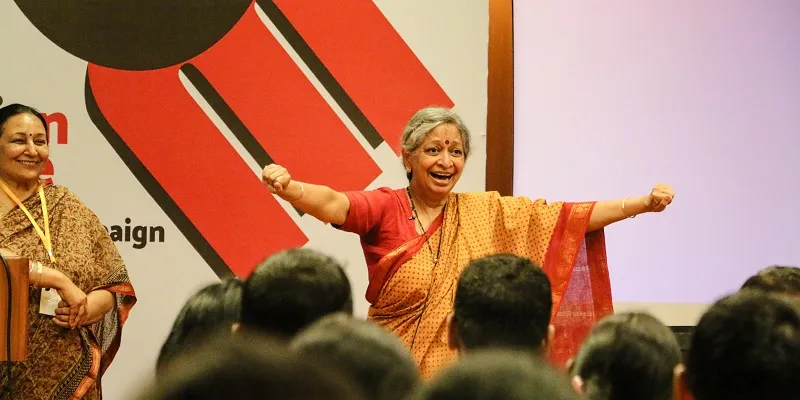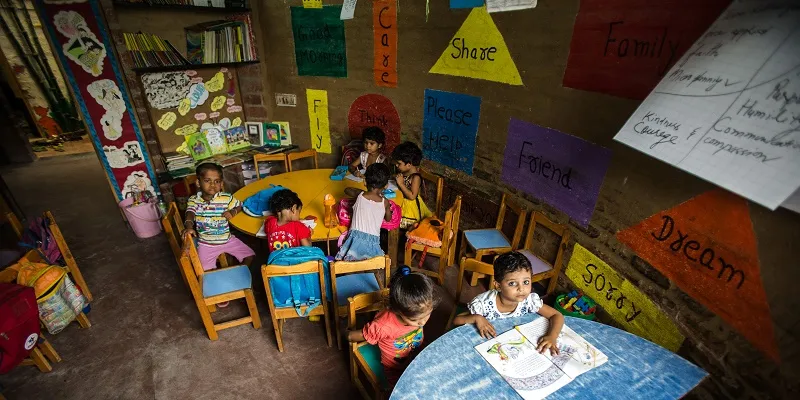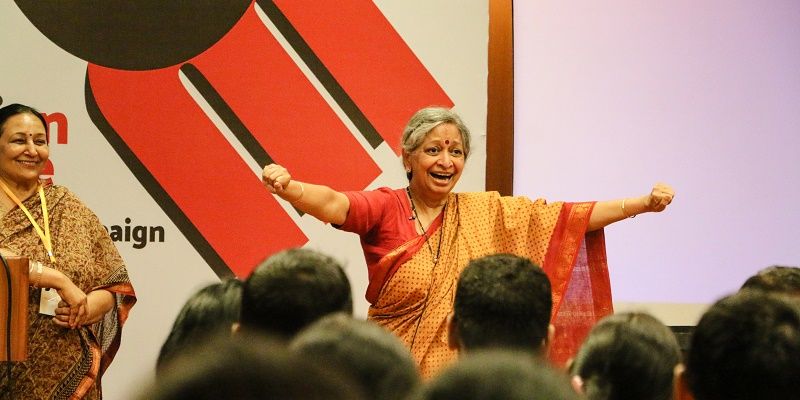Geeta Dharmarajan’s Katha uses stories to change slum-dwelling children’s destinies
Katha is an NGO that has been transforming the lives of underprivileged children for nearly 30 years.
Many years ago, a young girl student joined Katha Lab School located in Delhi's Govindpuri locality with dreams as strong as her determination. Hailing from the nearby slum area, she wanted to grow up to be an IAS officer. Years later, at one of the events organised at Katha, the team saw a white Ambassador with red beacon cruising in. Everyone was pleasantly surprised that the same girl, now an IAS officer, had come back to reminisce the starting point of her journey.
For generations, stories have been a medium of learning, and there is much knowledge we have gained from listening to our mothers and grandmothers tell tales of valour, adventure, and values. But what kind of stories are our 300 million urban poor listening to? The nature of urban poverty poses problems especially for the most vulnerable group, the children.
With a special focus on underprivileged children in the slums of Delhi, Katha, an NGO, aims to bring about change in all aspects that affect their growth, well-being, and potential, particularly their education, and help them overcome challenges—low incomes, lack of shelter, water supply and sanitation, health, nutrition, access to quality preschools and good schools.

Geeta Dharmarajan, Founder of Katha, says,
For the last 29 years, we have used story pedagogy to create the joy of learning and help children come out of poverty. By using such a powerful tool, Katha has helped over 90,00,000 children help themselves out of poverty, trained 29,000 of them in IT, and taught 3,70,000 women income-generation and social activism skills.
Geeta's professional editorial experience began with Target, a children's magazine, and continued with The Pennsylvania Gazette, the award-winning alumni magazine of the University of Pennsylvania. Geeta is also an author, with more than 30 children's books and over 450 articles in magazines and newspapers to her credit.
The beginning
Katha’s journey started in 1988 with their Tamasha, a magazine for first-generation schoolgoers. Katha was founded on September 8, 1989, serendipitously World Literacy Day. The aim of Katha was to enhance the joy of reading and the love of books among children and focus on bringing the power of stories to help transform the lives of those living in urban poverty.
Geeta recalls, “The seed of Katha was sown in my mind as I walked around the libraries of the University of Pennsylvania. I found myself with two thoughts—one, India is extremely lucky to have so many languages, and secondly, why are children in India not able to read in those languages?”
Until 2015, Geeta served as the Executive Director of Katha, spearheading and launching unique campaigns to reach out to children across the country. It was her vision to develop a unique story pedagogy which went on to form the basis of the curriculum in Katha Lab School. Today, Geeta continues to be the President and Chair of the Katha Board of Governors.
Changing lives one story a time
Stories don’t lead to results. They lead to questions. Stories help children ask the question—why? These make children curious and critical thinkers. This thinking leads to the changes we see on ground, explains Geeta.
It is projected that by 2030, nearly 50 percent of the population will be in the cities. As the urban population in the country is growing, so is urban poverty.

So, Katha focuses on bringing quality schooling and rich storybooks to these children, across the slums of Delhi, and create stories that look at all aspects that affect their growth, well-being, and potential.
Education = progress
Katha’s first reading programme was launched in 1988 in partnership with UNICEF and the Government of Delhi to take it to as many children from Delhi’s slums, and later the Government of Rajasthan chipped in for their schoolchildren as well. In 2001, the Katha team initiated the Tamasha Roadshow to work with street children, reading being part of their school-readiness plan and to help get them into formal school.
Padma Shri awardee Geeta says, “This has led to transforming them into what we call reader leaders. The story pedagogy helped us retain students at a young age when they are most likely to drop out of school due to their financial constraints or disinterest in studies. Over the last 29 years, our story pedagogy is used not only in the Katha Lab School but also in over 1000 government schools.”
The magnitude
The Katha team works with a pool of around 8,000 writers, translators, illustrators, photographers, and other creative people. They also have over 30,000 volunteers at the grassroots level. With this network, Katha has touched 950 communities in Delhi, of which 800 are actively working towards the vision of bringing reading to every child. The ‘I Love Reading’ programme has a pan-India presence with its roots in Delhi. Their presence in 35 municipalities of India and the rich resources of books translated from all over India helps them reduce the geographical boundaries.
Also read: 7 x 1 = 7, 7 x 2 = 14: isn’t education more than just learning by heart?
The support system
The NGO has had a long-standing association and relationship with large multinational and bilateral foundations such as the Dell Foundation, Tata Trusts, and Mahindra Foundation, that have generously funded Katha’s programmes to reach so many children. Various UN agencies including UNICEF have also contributed to Katha’s programmes.
Several individual donors, especially HNIs, donate to the programmes on a regular basis.
The Delhi government has also been supporting the NGO since 1991 by providing Katha with access to a network of teachers who work across the schools in the city.
However, to ensure that each rupee of donation is used effectively towards spreading learning, Katha follows the principle of frugal innovation. For example, for its I Love Reading campaign, Katha mobilised thousands of grassroots reading mentors and facilitated expansion through word of mouth.
Be the change
In India, schooling is often rigid and does not nurture the joy of learning with the focus being on scoring well in exams. Overcoming this attitude has been the biggest challenge faced by the Katha team.
Meeting challenges head-on and being entrepreneurial is part of Katha. One of the earliest challenges in setting up the Katha Lab School in Govindpuri was resistance from parents. Families were reluctant to send their children to school; most kids were bread earners. Twelve years of education was a luxury none of the families could afford.
So, Katha began with an income-generation programme for women who went on to become proud teachers, bakers, and embroiderers. The first small success led to Katha training more than 1,00,000 women in income-generation skills. Today, they earn more than 20 times what the family was earning just a decade ago!
This innovation has spread to half of Delhi's slums, and today, most mothers send their children to school.









![[Startup Bharat] Y Combinator-backed BeWell Digital is enabling the digital transformation of radiologists](https://images.yourstory.com/cs/2/40d66ae0f37111eb854989d40ab39087/ImagesFrames31-1648033042143.png)

